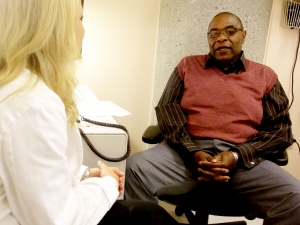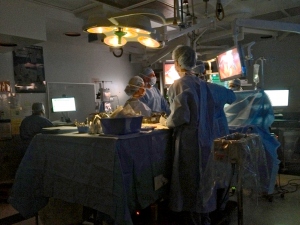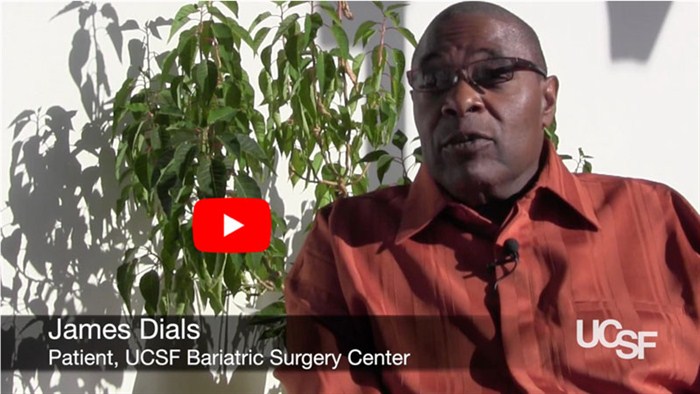Man Loses 200 Pounds With Surgery and Lifestyle Changes
Unless you weigh more than 400 pounds, it’s difficult to imagine walking a mile in James Dials’ shoes. In fact, for most of his life, he couldn’t do that either.
The gregarious 62-year-old limousine driver made friends easily, escorting musicians and athletes all over town. Sometimes they would shower him with choice tickets to concerts and sporting events.
But Dials always had to turn them down.
 Not because of a company policy or because he didn’t enjoy public events. Not too long ago, Dials weighed 434 pounds, and he couldn’t walk 10 feet without having to stop and catch his breath. The walk from the parking lot to the venue would have been a Herculean task for him to accomplish.
Not because of a company policy or because he didn’t enjoy public events. Not too long ago, Dials weighed 434 pounds, and he couldn’t walk 10 feet without having to stop and catch his breath. The walk from the parking lot to the venue would have been a Herculean task for him to accomplish.
“I could only take about 20 steps and stop and catch my breath,” Dials said. “Then, 20 more steps and then stop.”
He says low self-esteem and his love of his native Southern down home cooking contributed to his gradual weight gain. Before he knew it, Dials passed the 400-pound mark.
“My life was very uncomfortable,” Dials said. “I was a diabetic and I injected insulin. I had high blood pressure, sleep apnea, and high cholesterol. I was on all kinds of medications.”
That's when he discovered the UCSF Bariatric Surgery Center, a Level 1 accredited center for weight-loss surgery by the Bariatric Surgery Center Network of the American College of Surgeons, which means they provide complete bariatric surgical care. It is a nationally certified “center of excellence,” which offers a multidisciplinary approach to weight loss.
“James had relatively advanced obesity,” says Stanley J. Rogers, MD, chief of Minimally Invasive Surgery and director of the Bariatric Surgery Center and Liver Tumor Ablation Program at UCSF Medical Center. “And we know that weight loss either with or without surgery can significantly impact those medical problems, and can make these medical problems called co-morbidities go away as weight loss occurs.”
Obesity Becoming More Common
 Dials’ body mass index (BMI), which measures a person’s body fat in relation to one’s height and weight, was greater than 60. That measurement is considered “super obese.” Normal weight BMI is between 18.5 and 24.9. Anything greater than 30 is considered obese.
Dials’ body mass index (BMI), which measures a person’s body fat in relation to one’s height and weight, was greater than 60. That measurement is considered “super obese.” Normal weight BMI is between 18.5 and 24.9. Anything greater than 30 is considered obese.
“Super obese patients are becoming more common,” said Rogers. “In our program, I would say 20 percent of our patients are in that super obese category.”
Dials had to follow a strict regimen for six months before he was eligible for surgery. This included modifying what he ate and starting to exercise to lose some weight.
“Most people are not eating vegetables and fruit, and eating lots of starches and sugars and lots of fats, and heavy meats,” said Mary Ellen DiPaola, dietitian and diabetes educator at the UCSF Bariatric Surgery Center. “We need to get people to eat regular meals with lesser quantity of carbohydrates and a higher quantity of lower calorie vegetables and fruits. This is the initial education for these patients.”
Treatment Option of Last Choice
Dials was angry when he first came to UCSF. Angry that his “last resort” solution would not come fast enough. Angry that he was continuing to feel miserable while having health problems. Angry at himself for letting his life get so out of control.
“I hit rock bottom,” he said. “I mean, if you can’t walk 20 feet and that’s not enough pain to make you recognize that you hit rock bottom, I don’t know what is.”
Dials and his team at the UCSF Bariatric Surgery Center worked together to bring his weight down by more than 20 pounds before surgery.
“Certainly surgery is the treatment option of last choice for most patients with severe obesity,” Rogers said. “It’s something that we like to ensure that all other treatment for obesity has been tried before surgery because it has the highest risk associated with it.”
Surgery Saves His Life
Dials had gastric bypass surgery at UCSF a year ago.
He realized his life had changed when he could walk a block without getting out of breath.
“That was one of those moments,” he said. “And there was fear in even walking one block because I didn’t know whether I could make it or not.”
From that moment, Dials started a regular exercise routine, and began eating healthier foods in recommended quantities.
He has since lost more than 200 pounds. He is no longer a diabetic, and he doesn’t take any medication. The only pill he takes these days is a multivitamin.
“The surgery saved my life,” Dials said. “I truly don’t think I’d be here right now if I hadn’t had the surgery.
The team at UCSF Bariatric Surgery Program emphasizes that the patient must incorporate significant lifestyle changes for the surgery to be successful.
“What made James unique is that he was completely willing to follow our protocol and listen to our recommendations,” said Christina Spina, surgical physician assistant with the UCSF Bariatric Surgery Center. “He took this seriously and that's why he’s had the results he’s had.”
Like a 'Kid Getting a New Toy'
Dials is experiencing life anew these days. He can walk to places and develop deeper connections with people. He now has a girlfriend for the first time in many years.
“I have all sorts of choices now,” he said. “It’s like a kid getting a new toy on Christmas. That’s how life is to me now. Everything is new in life now. I have more self-esteem and I care more about myself. I ask for help now and I stay teachable.”
And being teachable has been a big part of his weight loss success.
“None of the surgical procedures we offer are fool-proof,” said Rogers. “And they require active participation in a program to help along that way with surgery to be successful at weight loss. We want them to be successful not just at a year or two, but at ten to 20 years down the road.”
Those upcoming years are ones that will be vastly different from the previous 62 for Dials.
“I can ride a bike and actually buy clothes that fit me,” he said. “I can do all sorts of things I didn’t think I could ever do again.”
To learn more about the UCSF Bariatric Surgery Program, visit these websites:
Photos by Leland Kim
